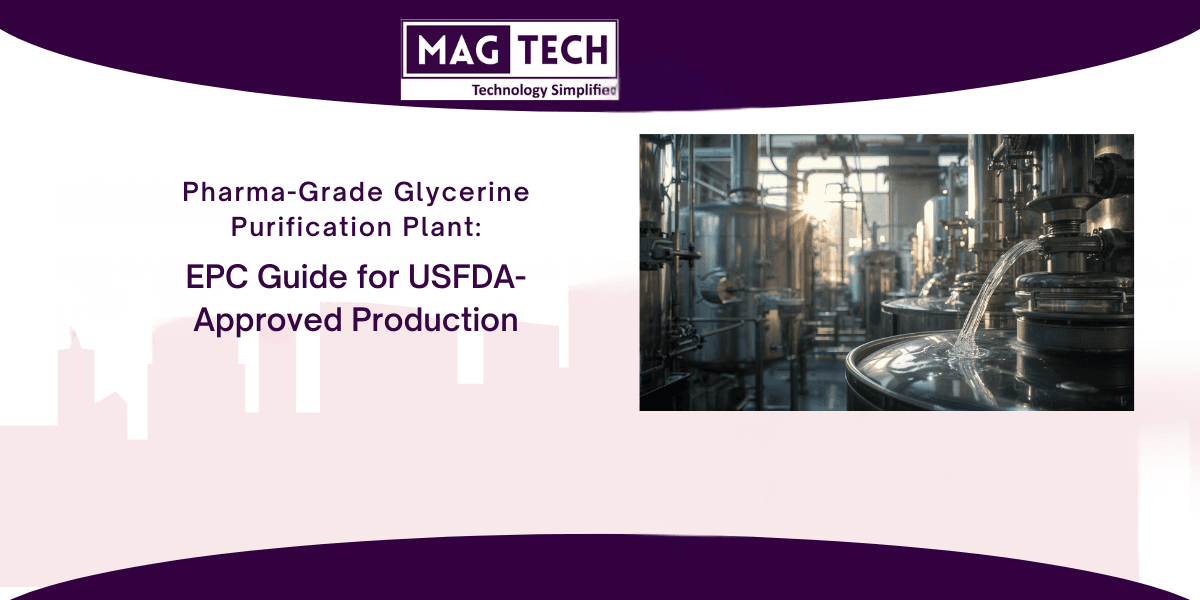The biodiesel industry in India is experiencing a remarkable transformation, with one byproduct gaining significant attention: glycerin. As biodiesel production expands across the country, so does the supply of crude glycerin. However, this crude glycerin requires purification before being valuable in industries like cosmetics, pharmaceuticals, and food processing.
The global glycerin market shows a promising CAGR of 5.37% (2023 – 2034). For biodiesel producers, a glycerin purification plant in India will be the best bet to tap into this potential market and generate another revenue channel, apart from being a solution to waste management.
Let’s take a quick look at the factors that are driving the demand for glycerin purification plants in India.
Table of Contents
ToggleKey Drivers of Glycerin Purification Unit Demands in India
The surge in demand for glycerin purification plants across India stems from several key factors that are reshaping the industry. Let’s explore what’s driving this growth in simple terms.
Growing Biodiesel Production in India
India’s biodiesel sector has expanded rapidly in recent years. Government mandates promoting biofuels have pushed production volumes higher. As per the International Energy Agency, India has the potential and demand to triple its biodiesel production by the end of 2028.
With each metric ton of biodiesel produced, about 100 kg of crude glycerin emerges as a byproduct, considering the feedstock and production process. As more biodiesel plants open and existing ones increase capacity, the supply of crude glycerin grows proportionally.
This abundant supply creates both a challenge and an opportunity. Without purification, crude glycerin has limited uses and low value. But with proper processing, it transforms into a valuable product. Biodiesel producers are realizing they can boost their bottom line by installing purification equipment rather than selling crude glycerin at rock-bottom prices.
Rising Value of Refined Glycerin
The price gap between crude and refined glycerin tells an important story. Crude glycerin (40% purity as s biodiesel byproduct) might fetch only INR 90 to 120 per kilogram (average estimation), while refined USP-grade glycerin (99.5% purity) commands prices around INR 140/kg (average estimation) depending on the region. This price difference makes investing in purification technology economically attractive.
For Indian biodiesel producers, the math is simple: purifying glycerin on-site can potentially triple or quadruple the value of this byproduct. As energy and production costs rise, this additional revenue stream becomes increasingly important for overall profitability.
Expanding Applications in Indian Industries
India’s industrial growth has created diverse markets hungry for refined glycerin:
- The booming personal care industry uses glycerin in soaps, lotions, and other cosmetics
- Pharmaceutical companies need glycerin for cough syrups, capsules, and medicines
- Food processors use it as a humectant, sweetener, thickener and preservative
- Textile manufacturers employ it as a softening agent
- Paint producers utilize their moisture-retention properties
Each of these industries requires high-purity glycerin that meets specific quality standards. Crude glycerin from biodiesel production contains impurities like methanol, water, and salts that must be removed through sophisticated purification processes. As these industries grow, so does the demand for locally-produced, high-quality refined glycerin.
Import Substitution Initiatives
India has historically imported much of its refined glycerin, particularly from Southeast Asian countries like Indonesia and Malaysia. However, government policies increasingly favor domestic production of critical industrial inputs. Programs supporting “Make in India” and reducing import dependence create favorable conditions for local glycerin purification.
By processing crude glycerin domestically, India reduces foreign exchange outflows while creating jobs and industrial capacity. Biodiesel producers who install purification equipment position themselves to benefit from these initiatives through potential tax benefits, subsidies, or preferential market access.
Sustainability and Waste Valorization
Environmental regulations and sustainability goals also drive the demand for purification plants. Crude glycerin, if improperly disposed of, can cause environmental harm. Purification transforms a potential waste problem into a valuable resource – a perfect example of circular economy principles in action.
Many biodiesel companies now view glycerin purification as part of their sustainability strategy. By creating value from waste, they improve their environmental footprint while enhancing profitability. This aligns with global trends toward resource efficiency and sustainable manufacturing.
The growing demand for glycerin purification plants reflects India’s maturing biodiesel industry. As producers seek to maximize value from all outputs, purification technology becomes essential infrastructure rather than an optional add-on. For biodiesel manufacturers, understanding these drivers helps inform smart investment decisions that position their businesses for long-term success in an evolving market.
Apart from market trends and economic benefits, a series of technological innovations and investment trends also contributed to the growth of glycerin purification units in India.
Technology and Investment Trends in the Glycerin Sector in India
The glycerin purification sector in India is evolving rapidly, with technologies and investment patterns reflecting the industry’s growing maturity.
Popular Purification Technologies
Indian biodiesel producers are adopting several purification approaches:
- Vacuum Distillation – Currently the most popular method, removing impurities through different boiling points while preserving glycerin quality
- Ion Exchange Systems – Growing in popularity for their ability to remove salts and other ionic contaminants effectively
- Membrane Filtration – Newer technology gaining traction for its lower energy requirements and continuous operation capabilities
- Combined Systems – Many plants now implement multi-stage purification, combining several technologies for optimal results
Smaller producers typically start with basic filtration and evaporation systems, while larger operations invest in comprehensive distillation plants that can achieve pharmaceutical-grade purity.
Investment Scale
The investment landscape shows varied commitment levels based on production capacity and desired purity levels. Small-scale plants process lower volumes daily, requiring modest investment suitable for biodiesel producers just entering the glycerin market. Medium-scale plants represent the most common investment choice, balancing capacity with economic efficiency. Large-scale facilities require substantial investment but enable economies of scale and often serve multiple biodiesel producers in a region.
Several technology providers now offer modular systems that allow for phased investment and capacity expansion. This approach helps producers start with essential purification capabilities and upgrade as their business grows.
ROI Considerations
Biodiesel producers evaluate purification investments based on:
- Payback period – The time needed to recover the initial investment varies based on plant size, technology choice, and market conditions. Most producers look for reasonable payback periods to justify the capital expenditure.
- Price premium – The significant value difference between crude and refined glycerin drives ROI. Higher purity levels command substantially better market prices, especially for pharmaceutical and food-grade glycerin.
- Operating costs – Energy consumption represents a major portion of operating expenses. Modern plants focus on energy efficiency to improve margins and sustainability.
- Market access – Higher grades open doors to pharmaceutical and food markets with better margins and more stable demand patterns.
The trend is clear: investments in glycerin purification technology are increasingly viewed as essential infrastructure rather than optional additions to biodiesel plants. However, there are certain challenges and opportunities that biodiesel producers should keep in mind.
Challenges and Opportunities Balancing Glycerin Purification Demand
The growing glycerin purification industry in India faces several challenges while also presenting significant opportunities for biodiesel producers.
Challenges
- Varying Crude Glycerin Quality – Glycerin from waste-based biodiesel often contains more impurities and lower glycerol content (40-75%), making purification more complex and costly.
- Technical Expertise – Operating purification equipment requires specialized knowledge that may be scarce in some regions of India, creating training needs for plant operators.
- Energy Requirements – Purification processes, especially distillation, demand significant energy inputs, affecting operational costs and environmental footprint.
- Market Volatility – Glycerin markets can experience significant fluctuations, making investment planning challenging.
- Regulatory Compliance – Meeting pharmaceutical and food-grade standards requires strict quality control systems and regulatory certifications.
Opportunities
- Domestic Market Growth – India’s expanding personal care, pharmaceutical, and food processing sectors offer ready markets for high-quality refined glycerin.
- Import Substitution – By producing refined glycerin locally, India can reduce dependence on imports from Southeast Asia, creating economic advantages.
- Value Addition – Transforming a low-value byproduct into premium-grade material significantly enhances the overall profitability of biodiesel operations.
- Sustainability Credentials – Complete utilization of biodiesel byproducts improves the environmental profile of producers, potentially opening doors to green financing and sustainable business certifications.
- Export Potential – As production capabilities mature, Indian producers can tap into international markets, particularly in neighboring countries and regions like the Middle East and Africa.
So, biodiesel producers in India must design a strategic approach to overcome the challenges and avail of the upcoming opportunities.
Let’s take a look at the future trends to understand how the glycerin market can be a lucrative opportunity.
Focusing on the Opportunities: A Future Outlook for Glycerin Producers
The future of glycerin purification in India looks promising as the sector matures and evolves.
Projected Growth of Purification Capacity
India’s glycerin purification capacity is expected to expand significantly as more biodiesel producers recognize the value proposition. This growth will likely be concentrated in regions with existing biodiesel clusters, creating economies of scale and technical expertise hubs.
Emerging Applications for Refined Glycerin
New applications are emerging beyond traditional uses:
- Biopolymer production for sustainable packaging
- Specialty chemicals for agricultural applications
- Green solvents replacing petroleum-based alternatives
- Phase change material (PCMs) production due to its thermal stability
- Used as dual dual-functional material (plasticizer and antinucleating agent)
- Used as a cryoprotectant to prevent damage to cell membranes during freezing and thawing
Recommendations for Biodiesel Producers
- Consider modular purification systems that can scale with production
- Form industry clusters to share purification infrastructure costs
- Develop relationships with end-users in high-value sectors like pharmaceuticals
- Invest in staff training to optimize purification operations
- Monitor technological developments to maintain a competitive advantage
As India’s self-reliance in chemical manufacturing grows, glycerin purification represents a strategic opportunity for biodiesel producers to participate in higher-value markets.
Be a Part of the Glycerin Purification Revolution with MAGTECH
The rapid growth of glycerin purification plants in India represents a significant shift in how biodiesel producers view their operations. Rather than treating glycerin as merely a byproduct, forward-thinking companies are recognizing its potential as a valuable revenue stream.
For those looking to build a glycerin purification plant in India and enter this promising market, seek professional assistance from MAGTECH, the leading glycerin purification solution provider. We provide the technical expertise, equipment selection guidance, and implementation support needed to establish efficient purification operations.


